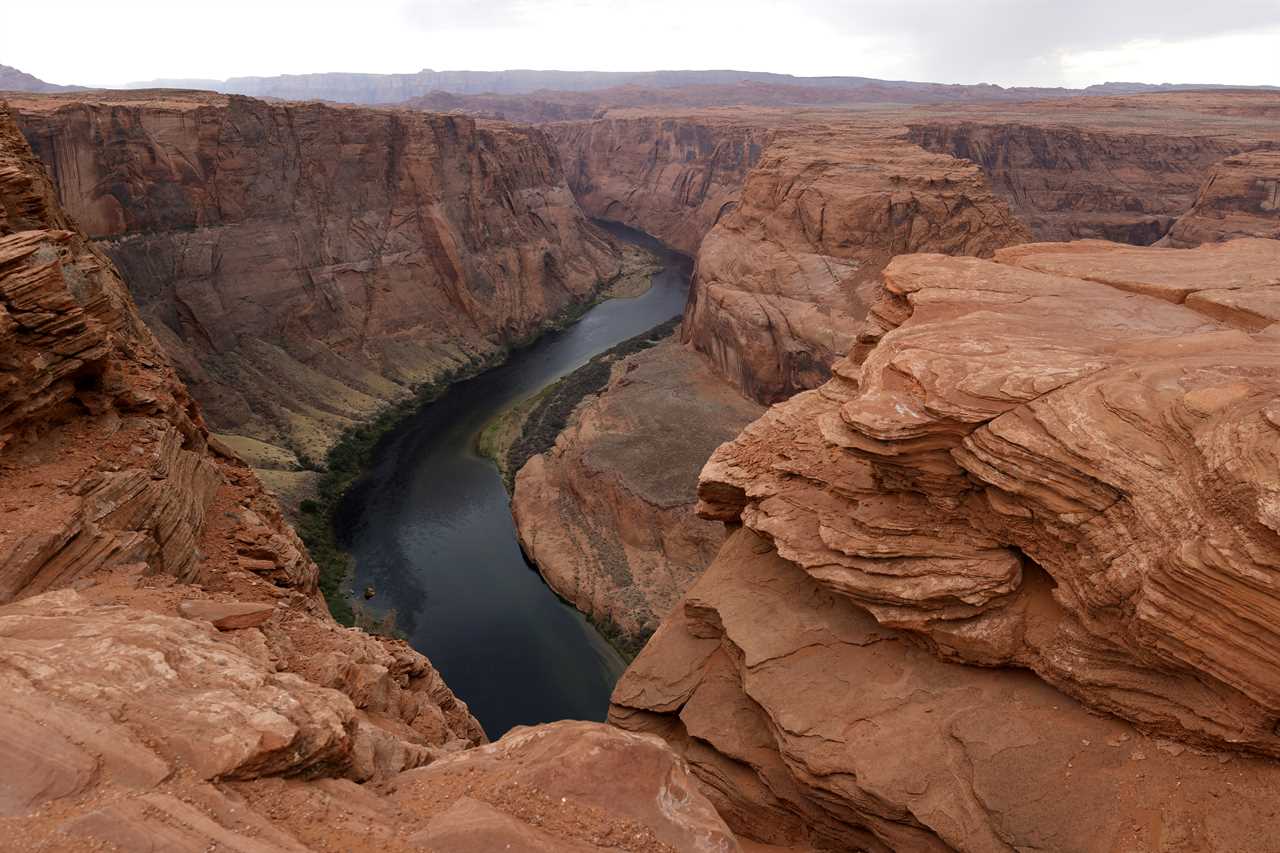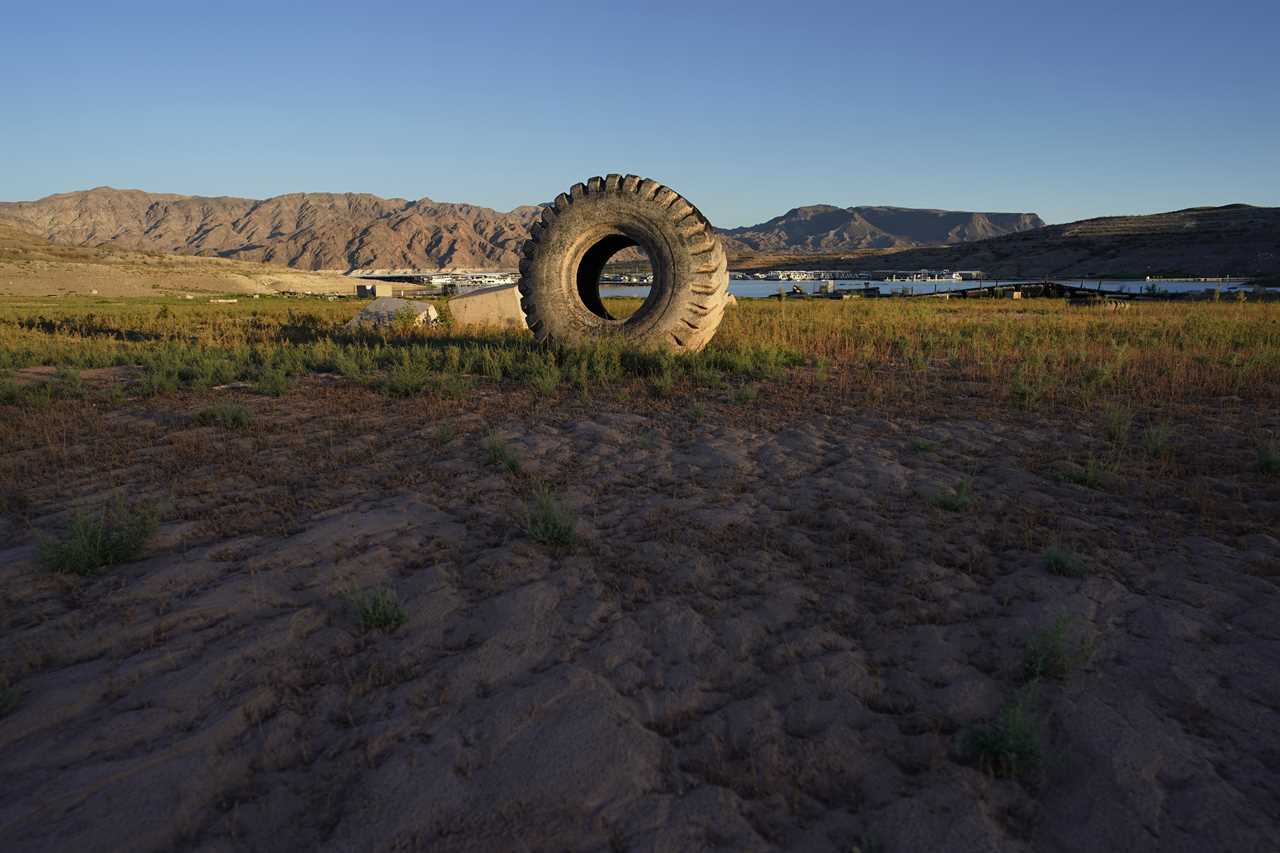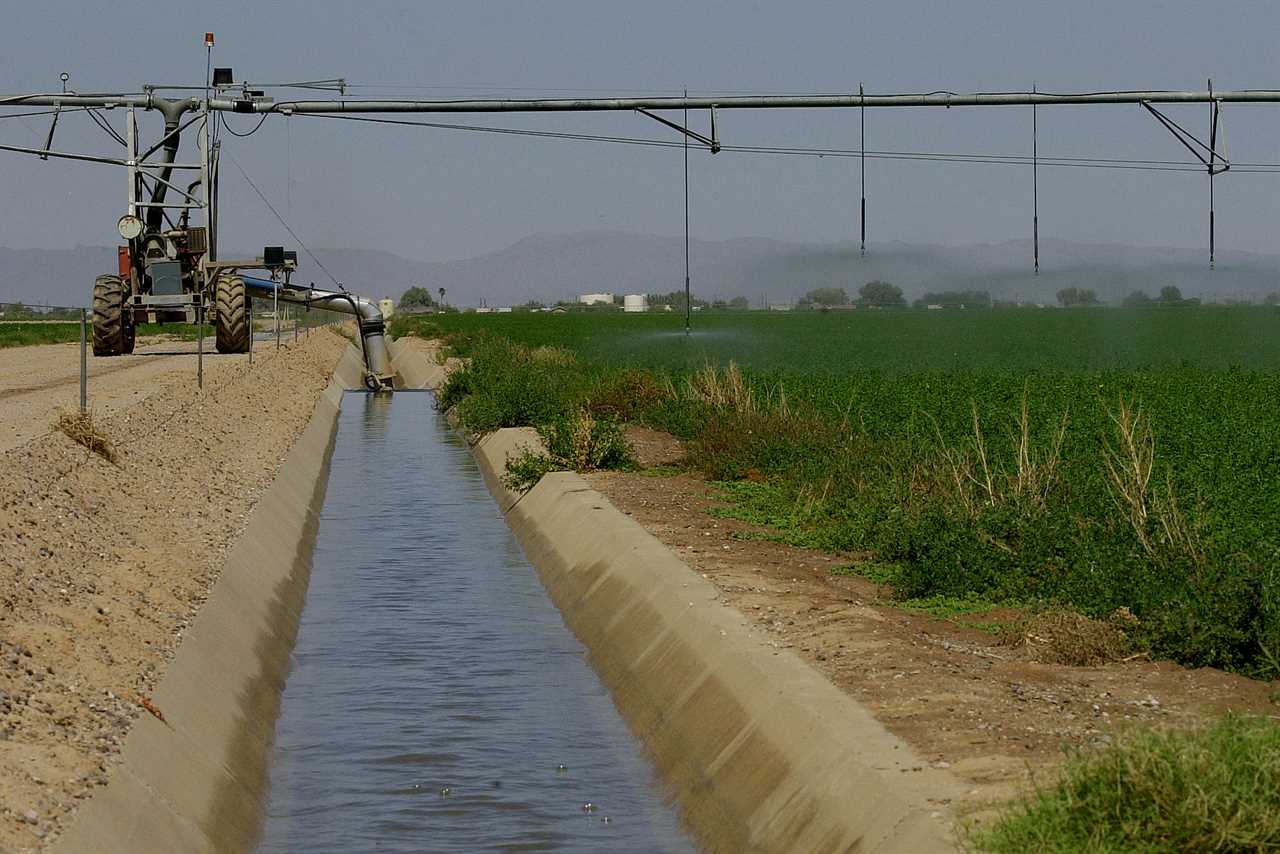
A fracas among the seven states along the drought-stricken Colorado River is forcing the first major reckoning for the Biden administration over who should bear the pain of adapting to a changing climate.
At issue is whether it’s fair to use century-old rules, created during an era of relative abundance, to ration water from the rapidly shriveling river now that the West is on the precipice of climate disaster. With California and its six neighbors locked in a dispute over two competing approaches to divvying up the cuts in water deliveries, whatever the administration decides will almost certainly end up in court.
The dispute is an early glimpse of the type of fights the U.S. will face as the warming climate supercharges drought, wildfires, storms and floods, forcing wrenching choices over which communities get protected. Those decisions pose a political minefield — something President Joe Biden's Interior Department is learning from the fight over the West's most important river, which is creating existential risks for some of the country's most economically and politically powerful states and industries.
The current feud centers on California, a longtime Democratic stronghold, and Arizona, a newfound swing state that has proven crucial to the party's control of the White House and Senate.
The 1,450-mile long Colorado River made much of the West inhabitable, and now supplies water to 40 million Americans from Wyoming to the border with Mexico, as well as an enormously productive agricultural industry. But climate change has shriveled its flows by 20 percent over the past two decades, and for each additional degree of warming, scientists predict the river will shrink another 9 percent.
Water levels at the system’s two main reservoirs are falling so fast, the Interior Department has said that water users must cut consumption by as much as a third of the river’s flows or risk a collapse that could cripple their ability to deliver water out of those dams. That would also cut off hydropower production that is crucial to the stability of the Western grid.
The states broadly agree that the vast majority of those immediate cuts must be made by the Lower Basin states of Arizona, California and Nevada, whose decades of overuse have accelerated the crisis. But the fight is over whether California, which holds strong legal rights to the lion's share of the Lower Basin's water, should have to share in those reductions.

This week, six of the seven states along the river asked the Biden administration to spread the cuts among the Lower Basin's water users. They argued, in effect, that climate change has so fundamentally altered the waterway that the century-old legal system governing who must sacrifice in times of shortage should not be the final word in how those cuts are divvied up.
But California, whose major agricultural regions would be among the last to take cuts under the existing rules, is refusing to budge from its legal claim. Its rival proposal for apportioning the pain would almost entirely cut off Colorado River deliveries to Phoenix, Tucson and the 11 Native American tribes getting water from central Arizona’s primary canal before California's agricultural users would face any mandatory cuts.
“We agree there needs to be reduced use in the Lower Basin, but that can’t be done by just completely ignoring and sidestepping federal law,” said J.B. Hamby, who leads the Colorado River Board of California and serves on the board of the state’s biggest user of the river’s water, the Imperial Irrigation District.
But Tom Buschatzke, director of Arizona’s Department of Water Resources, argued that his state agreed to take junior rights to river water back in 1968, before climate change was known to be a factor in shrinking the river's flow.
“Why should Arizona in the Lower Basin take the entire cost of climate change changes to the river?” he asked.
The state-level politics, alone, are a disaster for a Democratic administration.
On one side of the fight is the most populous state in the country with a $3.4 trillion economy, fueled in large part by its powerhouse agricultural sector. A Democratic stronghold run by a governor with his own presidential ambitions, California has also enacted some of the most aggressive climate mitigation policies in the country.
On the other side is Arizona — a swing state on which Democrats’ national electoral fate could turn — joined by every other state in the river basin.
And while the immediate fight is centered on Arizona and California, the Upper Basin states of Wyoming, Colorado, Utah and New Mexico, which backed Arizona's approach, have their own interest in moving toward a more flexible interpretation of century-old water rules. Climate change is expected to soon make it impossible for them to deliver the legally required amount of water to the Lower Basin without draconian cuts to their own cities and tribes — an even bigger brawl that will have to be fought out in the next two years.
But within each state, the fault lines aren't always clear. Since Western water law allows whoever claimed the water first to be first in line, agricultural users often hold some of the strongest rights, whereas cities and suburbs are almost always the first to take cuts.

Meanwhile, notably absent from the dueling proposals were any of the 29 tribes that reside within the river basin, and whose interests the Biden administration has vowed to be particularly attentive to. They haven’t been in the room for negotiations involving the states and the federal government.
Tribal interests on the river are also complex and competing: The Gila River Indian Community, whose ancestors farmed with Colorado River water for millennia, are among those most vulnerable to cuts under thepriority approach backed by California. But the Colorado River Indian Tribes hold senior rights decreed by the Supreme Court that align their interests with the Golden State's approach.
Environmentalists are also likely to enter the fight soon, with the fate of nearly three dozen endangered species hanging on the line and a risk that the Grand Canyon could one day have no river running through it.
Adding to the pressure on the Biden administration is the fact that lawmakers on Capitol Hill are increasingly jumping into the fray.
Arizona Democratic Sen. Mark Kelly won reelection last fall in one of the most competitive Senate races in the country after staking out an aggressive position defending his state’s Colorado River water interests — and fighting California’s. And a bipartisan group of lawmakers from Arizona and Nevada this week wrote Biden to endorse their states’ “consensus” proposal, calling it “a roadmap to avoid devastating economic impacts while sharing in the sacrifice of adapting to a permanently reduced water supply.”
But California’s Democratic Sens. Dianne Feinstein and Alex Padilla shot back in a statement contending that “six other Western states dictating how much water California must give up simply isn’t a genuine consensus solution.” Feinstein has for years wielded intense power over Western water issues on Capitol Hill and chairs the appropriations panel overseeing water funding.
The Biden administration won't have to make any tough decision on who wins and who loses just yet, though. First, the Interior Department will need to publicly lay out exactly what effect the competing approaches would mean to communities and ecosystems across the West if the next few years turn out to be dry ones.
The analysis is part of the National Environmental Policy Act process that Interior's Bureau of Reclamation launched in October to give itself legal cover if the states can’t reach agreement among themselves and the Biden administration decides it must act unilaterally — which it has indicated it could do as soon as this summer.
“The Department remains committed to pursuing a collaborative and consensus-based approach, and ongoing conversations with the Basin states, Tribes, water managers, farmers, irrigators and other stakeholders are helping to inform the supplemental process to revise the current interim operating guidelines for the operation of Glen Canyon and Hoover Dams,” Interior spokesperson Tyler Cherry said by email.
Some of the state negotiators think this process of publicly detailing the exact risks and costs to communities of the two competing concepts could help energize the negotiations among the states.
If the analysis of California's proposal shows the result would be "drying up the Central Arizona Project [and] major metropolitan areas and taking all of the water away from native American tribes, I think the choices will become really stark," said John Entsminger, Nevada's top Colorado River negotiator.
“I definitely think there’s still a chance for a seven-state agreement, and I think the modeling outputs that are going to be public could be very helpful for helping drive some form of compromise,” he said.
Regardless of how the negotiations turn out and what Interior decides, many legal experts expect the fight to ultimately land in court.
“No matter what that decision is, one or more of the states is going to sue the Bureau of Reclamation and we’re going to have to work this out through litigation,” said Rhett Larson, who teaches water law at the Arizona State University and has worked on water rights issues along the Colorado River.
But while a legal battle may be the only way to resolve some of the longstanding conflicts among the river’s users, it could also slow down the federal government’s ability to respond to a fast-evolving crisis on the Colorado River.
Even more concerning tofederal, state and local water managers is the risk that a court decision, particularly from the conservative supermajority on the Supreme Court, could end up curtailing the federal government’s broad authorities to manage not just the Colorado River, but waterways across the West. This would be occurring at a time when climate change requires flexibility to adapt to hydrologic systems that are evolving in unprecedented and unpredictable ways.
“The court could impose real limits on its ability to adapt existing laws to hydrologic and climatologic realities,” Larson said. “That’s something that the Bureau of Reclamation doesn’t want to do for practical reasons — climate change is changing our hydrologic systems and we need to be able to adapt it — and also for institutional reasons. No one likes to give up power.”
Reporter Camille von Kaenel contributed to this report.
----------------------------------------
By: Annie Snider
Title: Shrinking Colorado River hands Biden his first climate brawl
Sourced From: www.politico.com/news/2023/02/04/colorado-river-biden-climate-change-water-00080990
Published Date: Sat, 04 Feb 2023 07:00:00 EST






